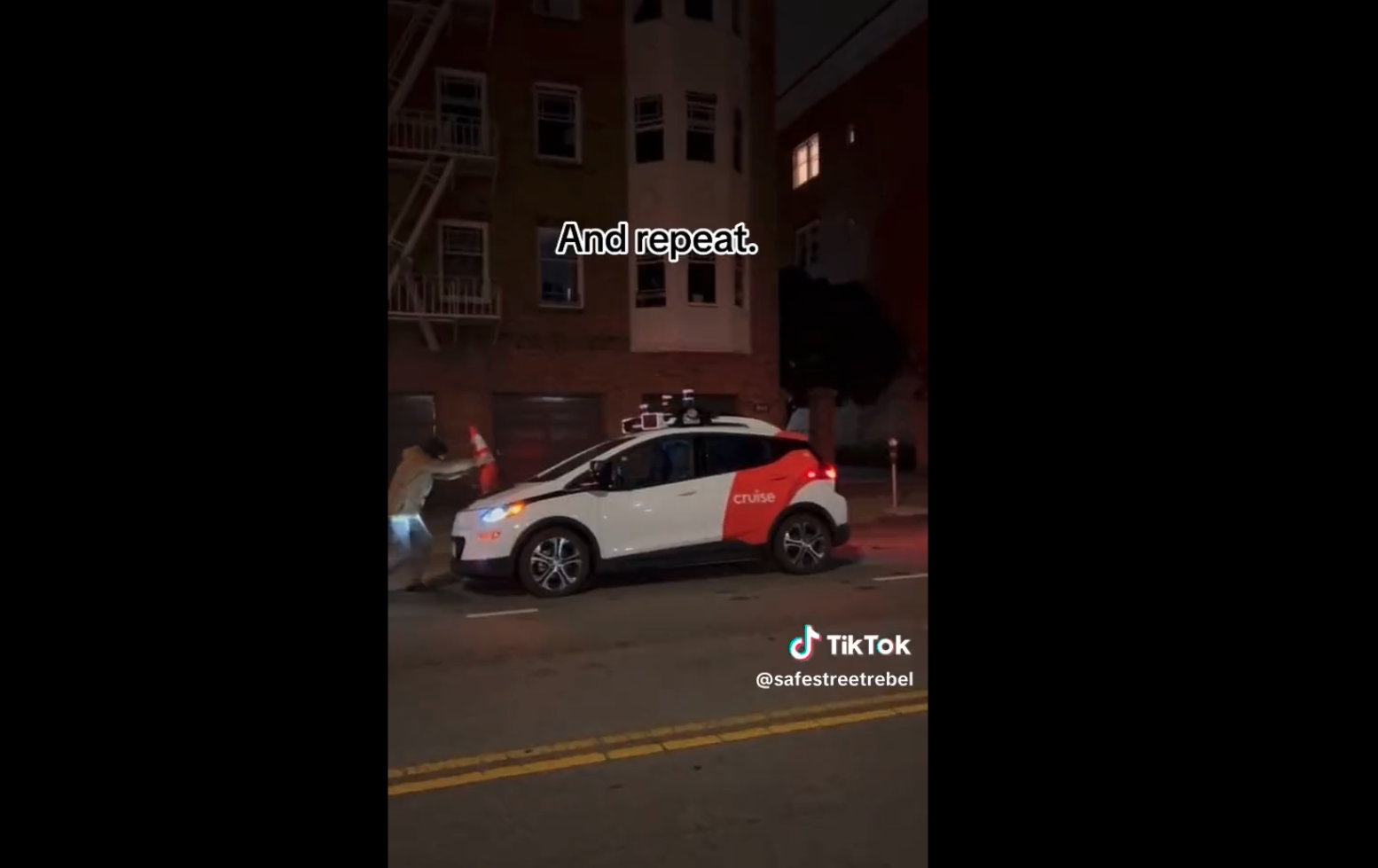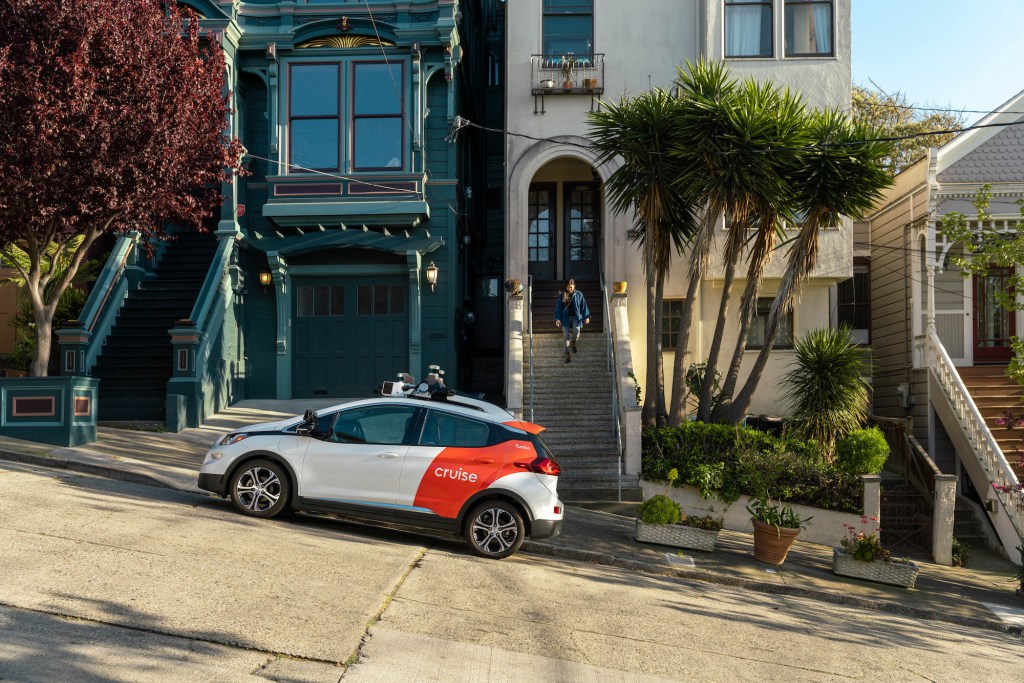A decentralized group of safe streets activists in San Francisco realized they can disable Cruise and Waymo robotaxis by placing a traffic cone on a vehicle’s hood, and they’re encouraging others to do it, too.
The “Week of Cone,” as the group is calling the now-viral prank on Twitter and TikTok, is a form of protest against the spread of robotaxi services in the city, and it appears to be gaining traction with residents who are sick of the vehicles malfunctioning and blocking traffic. The protest comes in the lead-up to a hearing that will likely see Waymo and Cruise expand their robotaxi services in San Francisco.
The California Public Utilities Commission (CPUC) is set to approve the expansion of both Cruise’s and Waymo’s autonomous vehicle passenger service deployments in San Francisco on July 13. The agency doesn’t give companies permission to operate their AVs on public roads — that’s the Department of Motor Vehicles’ domain. But it does grant companies the authority to charge passengers a fare for that service, which is an essential ingredient to scaling robotaxi and autonomous delivery operations sustainably.
In May, the CPUC posted draft resolutions approving the expansion, despite mounting opposition from city agencies and residents. Opponents called out the string of AVs that have impeded traffic, public transit and emergency responders, and asked that the CPUC move cautiously, set up workshops, collect more data, prohibit robotaxi deployment downtown and during peak hours, and limit the expansion of fleet sizes.

Other opponents like the San Francisco Taxi Workers Alliance and the Alliance for Independent Workers have protested the spread of robotaxis, which they say will eliminate the need for taxi and ride-hail drivers.
Safe Street Rebel’s cone campaign is a bid to raise awareness and invite more pissed-off San Franciscans to submit public comments to the CPUC before next week’s hearing.
“These companies promise their cars will reduce traffic and collisions, but instead they block buses, emergency vehicles and everyday traffic,” reads one video posted on social media. “They even un-alived a person and a dog. And they’re partnering with the police to record everyone all the time without anyone’s consent. And most importantly they require streets that are designed for cars, not people or transit. They exist only for profit-driven car companies to stay dominant and make it harder for transit to stay afloat.”
While the above statement is a bit hyperbolic, there are nuggets of truth. Cruise and Waymo vehicles have indeed stopped in the middle of roads, blocking emergency vehicles, public transit and general traffic. Recently a Waymo AV did hit and kill a dog, but it seems that the accident was unavoidable. In 2018, an Uber self-driving vehicle was involved in an accident that killed a pedestrian in Arizona, but so far no deaths have occurred as the result of AVs in San Francisco. And, yes, the police have tapped Cruise and Waymo for footage to help solve a handful of crimes, but there’s no evidence that the companies are working in tandem with law enforcement to record everyone all the time.
Nonetheless, the group brings up a common concern about unleashing autonomous vehicles onto public roads — the lack of input from everyday people who have to deal with the vehicles on the ground. Congressional efforts to regulate self-driving cars have lagged for several years, so most regulation comes from state departments of transportation and departments of motor vehicles.
“I see some tech bros wringing their hands in horror: ‘Won’t someone think of the AVs?!’” tweeted David Zipper, a visiting fellow at the Harvard Kennedy School’s Taubman Center for State and Local Government, in response to the cone challenge. “Couldn’t disagree more. California regulators are forcing San Franciscans to become guinea pigs for work-in-progress AV tech. Active protest is a reasonable response.”
Or to put it another way:
“Hell no. We do not consent to this,” said Safe Street Rebel.
The group is inviting others to follow its lead and disable the vehicles by “gently placing” cones on a driverless — meaning, empty — car’s hood. Some people are apparently sending in submissions, but it’s unclear how many people have sent images to Safe Street Rebel. The group did not respond to TechCrunch’s request for comment.
Waymo called the viral hack a form of vandalism.
“Not only is this understanding of how AVs operate incorrect, but this is vandalism and encourages unsafe and disrespectful behavior on our roadways,” the company said in a statement. “We will notify law enforcement of any unwanted or unsafe interference of our vehicles on public roadways.”
Again with the hyperbole. The definition of vandalism is to intentionally damage someone’s property — think slashed tires or broken windows. Waymo probably won’t have any luck sticking a vandalism charge on someone who puts a cone on the hood of its vehicles.
Cruise told TechCrunch that it has a strong safety record and that, when compared to a human driver, its autonomous driver had 73% fewer collisions with meaningful risk of injury.
“Cruise’s fleet provides free rides to late-night service workers without more reliable transportation options, has delivered over 2 million meals to food insecure San Franciscans, and recovers food waste from local businesses,” said Cruise in a statement. “Intentionally obstructing vehicles gets in the way of those efforts and risks creating traffic congestion for local residents.”
Despite the guerilla protests, the cone trick probably won’t have an effect on the CPUC’s decision. There’s enough support from other stakeholders — including elected officials, accessibility advocates, technology industry groups and business and economic development organizations — for the CPUC to brush dissent under the rug. And according to the upcoming hearing’s agenda, it looks like the agency is ready to approve the program authorization.
“Cruise’s proposed service is not anticipated to result in significant safety risks,” reads an agenda item. The same sentiment is repeated for Waymo.
This article has been updated with a statement from Cruise.
Cruise’s autonomous driving tech comes under scrutiny from safety regulators






























Comment